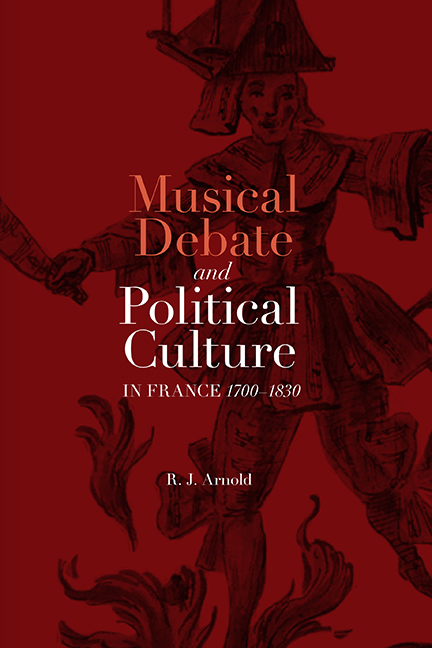Book contents
- Frontmatter
- Contents
- List of Illustrations
- Introduction
- 1 Parallels, Comparisons and Ripostes: The Raguenet–Lecerf Controversy, 1702–32
- 2 Spectators, Satirists and Sectarians: The Ramiste–Lulliste Querelle, 1733–51
- 3 'A Vast Negotiation': The Querelle des Bouffons, 1752–54
- 4 The Spirit of Contradiction: The Gluckiste–Piccinniste Querelle, 1774–88
- 5 A Revolutionary Interlude: 1789–1800
- 6 The End of the Party: New Avenues for Musical Dispute, 1800–30
- Conclusion
- Select Bibliography
- Index
- Music in Society and Culture
5 - A Revolutionary Interlude: 1789–1800
Published online by Cambridge University Press: 29 May 2021
- Frontmatter
- Contents
- List of Illustrations
- Introduction
- 1 Parallels, Comparisons and Ripostes: The Raguenet–Lecerf Controversy, 1702–32
- 2 Spectators, Satirists and Sectarians: The Ramiste–Lulliste Querelle, 1733–51
- 3 'A Vast Negotiation': The Querelle des Bouffons, 1752–54
- 4 The Spirit of Contradiction: The Gluckiste–Piccinniste Querelle, 1774–88
- 5 A Revolutionary Interlude: 1789–1800
- 6 The End of the Party: New Avenues for Musical Dispute, 1800–30
- Conclusion
- Select Bibliography
- Index
- Music in Society and Culture
Summary
DURING the French Revolution, or at least in the eventful five years between the fall of the Bastille and the execution of Maximilien Robespierre, there were no operatic querelles. The slight bathos of that statement points toward the idea that there were more pressing and interesting subjects for action and debate than the respective merits of different styles of opera – and this was certainly the case for some. Nonetheless, the notion that Frenchmen sternly put aside their frivolous aesthetic concerns after 1789 does not quite cover the facts. While previous querelles had occurred at a concurrence of an excitable political atmosphere and an artistic challenge that demanded a response, the turbulence of the Revolution came at a time of relative repose in the development of opera: the ‘revolutions’ effected by Gluck and others fifteen years earlier had thoroughly bedded in, and the political and cultural cycles were not precisely in alignment. At the same time, the rather self-conscious sense of regeneration after 1789 encouraged some to look back with a critical eye at the operatic querelles of preceding decades.
This chapter intends to look at ways in which the absence of querelles was rationalised during the Revolutionary years. Before that, it is necessary to ask briefly what might or might not have changed in the structure and mechanisms of French operatic life after 1789. The Académie Royale de Musique remained so called until the summer of 1791, and this continuity symbolised the way that it avoided rapid or violent repurposing as some sort of Revolutionary institution. There were those who condemned opera as an inappropriately elitist, expensive or trivial spectacle, but so there had been before the Revolution, too; what was noticeable, from the occupation of the theatres by the Paris crowd on 12 July 1789, up to the decision of the Terror-era government in 1794 to grant a subsidy to the Opéra, was a willingness of the Revolutionary authorities to take over and work with the established structures of national culture, rather than attempting to create their own.
- Type
- Chapter
- Information
- Musical Debate and Political Culture in France, 1700–1830 , pp. 152 - 176Publisher: Boydell & BrewerPrint publication year: 2017

